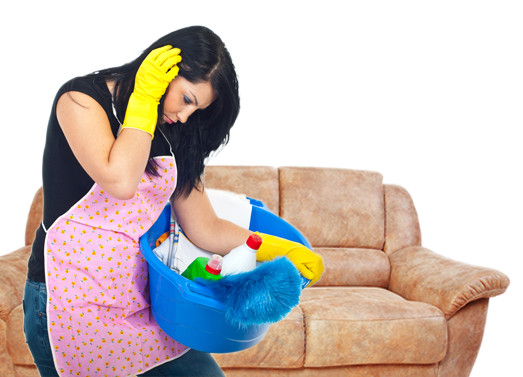Manage Your Home with an Effective Cleaning Strategy
Posted on 04/09/2025
Manage Your Home with an Effective Cleaning Strategy
There's no place like a clean home. Keeping your living space tidy offers a sense of peace, eases stress, and improves overall health. But with demanding schedules and endless responsibilities, maintaining a spotless residence can seem daunting. Luckily, implementing an effective cleaning strategy can streamline your chores, organize your routine, and transform your space.
In this comprehensive guide, discover how to manage your home with efficient cleaning strategies, create routines tailored to your lifestyle, and maintain a neat environment throughout the year.
Why You Need a Practical Home Cleaning Strategy
Before you pick up a broom, it's essential to understand the benefits of a thoughtful cleaning approach. A well-structured plan reduces clutter, prevents the buildup of dirt, and allows your household to run smoothly. Here's why investing time in a cleaning system pays off:
- Reduces Stress: A predictable cleaning routine cuts back on panic cleaning sessions and day-to-day anxiety.
- Boosts Productivity: A tidy space encourages focus, making daily tasks easier and more enjoyable.
- Improves Health: Regularly sanitizing surfaces reduces allergens and germs, keeping your family healthier.
- Saves Time: With a structured schedule, you avoid spending hours catching up on overdue chores.
- Enhances Home Value: Maintaining cleanliness protects your investments and keeps your property inviting.

How to Design an Effective Cleaning Plan for Your Home
An effective home cleaning strategy isn't one-size-fits-all. The best method is tailored to the household's needs, size, lifestyle, and schedules. Consider the following steps to create your ideal plan:
1. Assess Your Spaces
Start by identifying high-traffic areas, neglected spots, and primary sources of mess. Walk through each room, noting:
- Which spaces collect the most dust or clutter?
- Where do you spend most of your time?
- Are there zones needing more frequent attention (e.g., kitchen, bathrooms)?
2. Establish Cleaning Zones
Divide your home into logical zones--such as bedrooms, living spaces, kitchen, and bathrooms. Assign each zone a cleaning frequency depending on its use and the amount of dirt it accumulates.
For example:
- Daily: Kitchen counters, bathroom sinks, tidying living rooms.
- Weekly: Floors, bedding, dusting shelves.
- Monthly: Baseboards, window sills, ceiling fans.
3. Choose the Right Cleaning Supplies
Stock your cleaning caddy with high-quality, multi-purpose supplies. Invest in reliable tools to save time and effort, such as:
- Microfiber cloths and dusters
- All-purpose spray and disinfectants
- Scrub brushes and sponges
- Floor mop and vacuum
- Bathroom-specific cleaners
Tip: Natural and eco-friendly cleaning products safeguard your family's health and the planet.
The Importance of Routine: Scheduling for Success
Consistency is key for any successful home cleaning strategy. Setting up cleaning routines--daily, weekly, and monthly--organizes your efforts and keeps your home fresh year-round.
Daily Cleaning Tasks
- Make beds: Instantly tidy bedrooms.
- Wipe kitchen counters and tables: Prevents crumbs and bacteria buildup.
- Handle dishwashing: Avoids messes and pests.
- Tidy living spaces: Fluff pillows, fold blankets, clear clutter.
- Clean bathroom sinks and mirrors: Stops scum accumulation.
Weekly Cleaning Tasks
- Dust surfaces: Shelves, electronics, and baseboards.
- Vacuum and mop floors: Focus on high-traffic areas.
- Change bedding and towels: Freshens bedrooms and bathrooms.
- Clean appliances: Microwave, coffee maker, and fridge handles.
- Sanitize door handles and light switches: Reduces germ transfer.
Monthly Cleaning Tasks
- Wash windows and blinds: Let in the light and remove grime.
- Deep clean under furniture: Reach forgotten dust bunnies.
- Organize closets and storage: Prevent clutter from accumulating.
- Clean out pantry and refrigerator: Dispose of expired items.
- Descale faucets and shower heads: Maintain water flow and hygiene.
Strategic Tips for an Organized Home
- Set Realistic Goals: Start small--aim for one or two rooms or chores per day to avoid burnout.
- Create a Checklist: A visible daily or weekly list helps track progress.
- Delegate Tasks: Get the whole household involved, assigning age-appropriate chores to each member.
- Declutter Regularly: Less stuff equals less cleaning--donate, sell, or toss unused items quarterly.
- Use Storage Solutions: Bins, baskets, and organizers keep surfaces clear.
- Prevent Mess Before It Happens: Place doormats at entrances and enforce "no shoes indoors" rules.
Adapting Your Home Cleaning Strategy for Busy Lifestyles
Life can be hectic, but a busy schedule doesn't mean your home must suffer. Adapt your cleaning strategy to your unique needs with these suggestions:
Prioritize High-Impact Areas
Focus on spaces that influence your daily comfort--the kitchen, bathrooms, and main living areas. A quick, daily tidy-up in these spots can drastically improve the overall appearance of your home.
Embrace the Power of Micro-Cleaning
Short, focused cleaning bursts--sometimes called "speed cleaning"--work wonders. Set a timer for 10-15 minutes, tackle a task (like wiping counters or sweeping floors), and move on. Over the week, these small sessions add up.
Make Chores a Family Affair
Distribute age-appropriate tasks to each family member. Consider having a weekly cleaning day with music and snacks to make it fun. It builds responsibility and turns household upkeep into teamwork.
Use Technology to Your Advantage
Consider using apps or smart home devices to schedule reminders, track tasks, or automate chores with robotic vacuums.
The Benefits of a Clean Home
Maintaining a clean environment is about more than aesthetics. Regular, organized cleaning routines positively impact every aspect of your life:
- Improved Health: Reduces allergens, asthma triggers, and infection risks.
- Less Stress and Anxiety: A tidy home leads to a calm mind and restful sleep.
- Higher Productivity: Clean, ordered spaces promote concentration for work and study.
- Increased Safety: Regular cleaning minimizes the risk of slips, trips, and accidents.
- Welcoming Atmosphere: Friends and family feel more comfortable in your home.
FAQs on Developing a Home Cleaning Routine
How often should I deep-clean my home?
Deep cleaning is best done at least once seasonally (four times a year). This involves moving furniture, washing windows, cleaning carpets, and addressing overlooked nooks and crannies.
What's the difference between regular and deep cleaning?
Regular cleaning includes tasks you do frequently, like wiping surfaces, vacuuming, and washing dishes. Deep cleaning targets invisible dirt and grime, tackling areas like inside appliances, grout lines, and baseboards.
How do I stay motivated to keep my home clean?
Reward yourself for reaching cleaning milestones, break tasks into small chunks, and track your progress. Playing upbeat music or listening to podcasts can also make chores more enjoyable.
Should I use a cleaning schedule template or app?
Templates and apps help you organize and stick to your cleaning strategy. Search for printable checklists or use digital apps like Todoist, Tody, or Google Keep to stay on top of regular tasks.
Seasonal Home Cleaning: Adapting Your Strategy Throughout the Year
Every season presents new cleaning challenges. Adjust your home cleaning plan by anticipating seasonal needs:
- Spring: Deep-clean windows, closets, and yard. Declutter winter gear and freshen upholstery.
- Summer: Stay ahead of dust and pollen, wash outdoor furniture, and vacuum more frequently.
- Autumn: Clear gutters, clean chimneys, and prep homes for cozy indoor months.
- Winter: Sanitize entryways, prioritize floors due to wet/muddy shoes, and frequently launder blankets.

Making Your Cleaning Strategy Sustainable
An efficient home cleaning routine can (and should!) be sustainable. Reduce your environmental footprint by choosing eco-friendly supplies, minimizing waste, and using reusable cleaning tools.
- Opt for Reusable Microfiber Cloths over paper towels.
- Use Concentrated Cleaners to save on packaging.
- Recycle and Compost whenever possible.
- Embrace DIY Green Cleaning with ingredients like vinegar and baking soda.
Conclusion: Make Your Home Shine with a Personalized Cleaning Strategy
With intentional planning, organizing, and routines, managing your home with an effective cleaning strategy becomes achievable for everyone. Not only does it keep your living space inviting and healthy, but it also empowers you to reclaim your time. Remember, a clean home is a happy home. Start small, stay consistent, and let your personalized approach transform your everyday life!
Ready to take control of your home? Begin crafting your own cleaning strategy today--and watch your house become a haven of comfort, order, and tranquility.
Latest Posts
How Air Quality Management Transforms Residential and Commercial Experiences
Streamline Your Cleaning with Clever Techniques
How to Safeguard the Fabric When Washing Velvet Curtains





